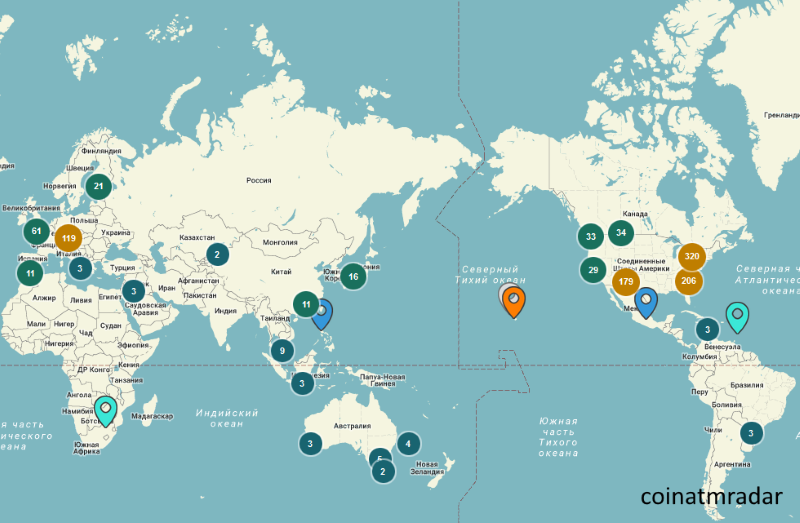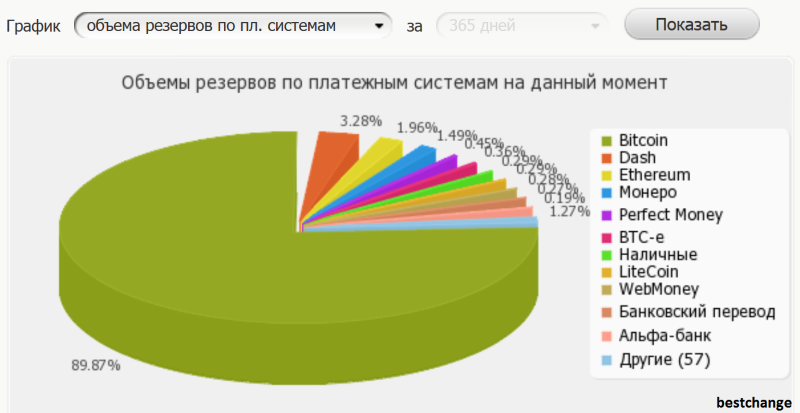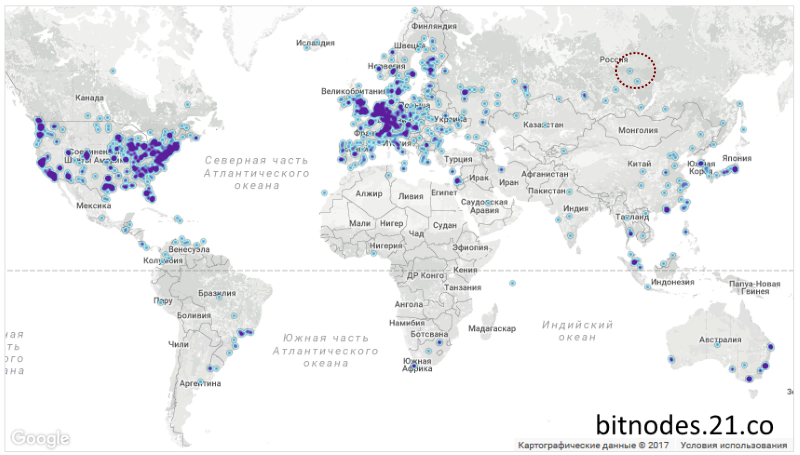Bitcoin in Russia: who uses?
If you type “Bitcoin” in Habr's search, then 512 publications will fall into the result: there is a lot about the technical component (which is logical), news of different levels and formats, descriptions of various projects ... And today I would like to talk about what btc really is? And not just anywhere, but in Russia.
I have already published an interesting map showing ATM-btc around the world. Here she is

Recently, the first crypto-terminal appeared in St. Petersburg. The first is the key word.
')
This card is higher and more interesting: in a huge country with an area where cash still runs the show (which, it’s true, they are trying to cover up), where even the largest terminal network with a world name in general - Qiwi is trying to enter the market of virtual currencies ( ?), it was only in 2017 that the first automated exchanger appeared in the “input” style: for the sake of justice, I’ll note that there have been attempts to go offline.
I will not reveal a great secret if I say that the whole question is about risks:
All this is so. But progress cannot be stopped?
At the same time, according to Bestchange (for comparison, I also took the LocalBitcoins exchange and other monitoring) - one of the most popular areas in the exchange business are the pairs: Qiwi - Btc (back and forth), Btc to Privat and to Sberbank.
The popularity of the Qiwi exchange is clear : the terminals are anonymity (even when the phone is tied), and Bitcoin and anonymity keep pace (if you’re walking, of course). With the Security Council and Privat everything is also clear. But the question is different - in volume.
For clarity, the following chart (also with bestchange, for which a special thanks to him):

And for accuracy - in the context of the volume of stored funds:

It turns out that the picture is quite simple and obvious in my opinion: over the past 3-4 years, the exchangers switched to crypto, just like their clients. There seems to be a truth behind this capital (because identification according to Federal Law No. 161 doesn’t suit very few people, because crypto is popular in the world and market growth is obvious, etc.) there is one more layer: the society in Russia may well create alternative economic flows at any vicissitudes of fate (or those who hide behind it). Therefore, in my opinion, developers of bills in the style of the Ministry of Finance should think 10 times before sending for consideration and signature projects like those called BTC and others like " money surrogates ."
But we go further - to the Bitcoin network nodes.

I walked through these “above PCs” and got the expected result (below is the summary list in the format “city - number of nodes”):
The full list looks like this:
Incomplete Chart:

And for greater clarity, with sorting by the number of nodes:

Brief explanation:
1. Total - 52 settlements I managed to find;
2. There are no special surprises - Moscow and the region, million-plus cities, then all the rest;
3. Among other things there are in the list and public institutions
4. Separate hostings were also noticed:
5. 26% of the nodes are not identified by location, although it is not difficult to do this (approximately - by location);
6. The TOP called a settlement called Zheleznodorozhny (judging by the additional analysis - from the Moscow region). Maybe someone from Habrozhiteley knows what he is so remarkable?
7. In addition, Zhukovsky flashed on the map: the science city, though.
What seemed strange (this is, of course, purely personal): first of all, that in Eastern Siberia, and mainly - in the Irkutsk region, the capacities are not that great. Although it would seem: access to the Network is, there is no light cheaper, China for ordering (even bringing) equipment is at hand ... The main thing is that in the city and the whole region they know about btc (according to polls at various events, about 50% of those present). In general, it is just a mystery.
Then, for a change, I took another site - blockchain.info, which, according to Forklog, is the most popular online bitcoin wallet in Russia (albeit, after trying to break in percentage, it sank a little).
From 16 829 there were 46 ip-addresses from Russia . At the same time, I met ip-addresses that obviously have nothing to do with Russia, but the flag is precisely Ru: most likely blockchain.info identifies users by additional parameters, for example, by language localization.
Of course, VPN, TOR, and other means of “bypassing locks” (and with them, for example, transaction mixers) and not only they play an important role in this statistics: say, the same blockchain.info has its own website in .Onion-network duplicate. In addition, the risks identified above do not give much rest, which means that the face of the average Russian user btc is heavily masked.
But in general, Bitcoin is just about that, isn't it?
This mini-analysis once again led me to the following conclusions:
The prohibition (and he actually was from 2014 to 2016) bitcoin by statements of the Central Bank, the Ministry of Internal Affairs, the Prosecutor's Office, the UK, the Ministry of Finance and a number of other bodies did not lead to positive results for state bodies, rather - on the contrary: I think the example of LocalBitcoins in this sense - the brightest. One of - for sure.
Despite the fact that bit-coins and anonymity embrace each other, D. Assange also noted that, together with them, they can give negative (side?) Effects, the worst of which are:
These so-called “three horsemen of the Apocalypse” are evil and it is generally meaningless to fight it with identification methods that exist in the classical world of centralization.
Therefore, it is important to create a reputation system that would meet the three minimum requirements:
It is very important that the reputation should be one for life: it can not be zeroed, taken away or destroyed.
Who needs it? Anyone who is not tied to the drug and porn business, terrorism and other unpleasant things, but wants to:
I would call such a system a “ human blockchain ”, where each block is one person, identified with the necessary accuracy for the realization of specific rights and the performance of corrosive duties both in global and local networks.
I hope there will be suggestions, explanations, comments on what was said, because The topic in my opinion is alive and necessary. Thanks for reading this, not short, text!
I have already published an interesting map showing ATM-btc around the world. Here she is

Recently, the first crypto-terminal appeared in St. Petersburg. The first is the key word.
')
This card is higher and more interesting: in a huge country with an area where cash still runs the show (which, it’s true, they are trying to cover up), where even the largest terminal network with a world name in general - Qiwi is trying to enter the market of virtual currencies ( ?), it was only in 2017 that the first automated exchanger appeared in the “input” style: for the sake of justice, I’ll note that there have been attempts to go offline.
I will not reveal a great secret if I say that the whole question is about risks:
All this is so. But progress cannot be stopped?
At the same time, according to Bestchange (for comparison, I also took the LocalBitcoins exchange and other monitoring) - one of the most popular areas in the exchange business are the pairs: Qiwi - Btc (back and forth), Btc to Privat and to Sberbank.
The popularity of the Qiwi exchange is clear : the terminals are anonymity (even when the phone is tied), and Bitcoin and anonymity keep pace (if you’re walking, of course). With the Security Council and Privat everything is also clear. But the question is different - in volume.
For clarity, the following chart (also with bestchange, for which a special thanks to him):

And for accuracy - in the context of the volume of stored funds:

It turns out that the picture is quite simple and obvious in my opinion: over the past 3-4 years, the exchangers switched to crypto, just like their clients. There seems to be a truth behind this capital (because identification according to Federal Law No. 161 doesn’t suit very few people, because crypto is popular in the world and market growth is obvious, etc.) there is one more layer: the society in Russia may well create alternative economic flows at any vicissitudes of fate (or those who hide behind it). Therefore, in my opinion, developers of bills in the style of the Ministry of Finance should think 10 times before sending for consideration and signature projects like those called BTC and others like " money surrogates ."
But we go further - to the Bitcoin network nodes.

I walked through these “above PCs” and got the expected result (below is the summary list in the format “city - number of nodes”):
The full list looks like this:
- Moscow 45.00
- Unknown 44.00
- St. Petersburg 12.00
- Novosibirsk 4.00
- Ekaterinburg 3.00
- Zheleznodorozhny 3.00
- Omsk 3.00
- Tula 3.00
- Volgograd 2.00
- Kaliningrad 2.00
- Krasnodar 2.00
- Saratov 2.00
- Tomsk 2.00
- Khabarovsk 2.00
- Chelyabinsk 2.00
- Alexandrov 1.00
- Astrakhan 1.00
- Belovo 1.00
- Vladivostok 1.00
- Vladimir 1.00
- Terrible 1.00
- Dolgoprudny 1,00
- Zheleznogorsk 1.00
- Zhukovsky 1.00
- Irkutsk 1.00
- Kazan 1,00
- Kalach 1.00
- Kamyshin 1.00
- Kostroma 1.00
- Lyubertsy 1.00
- Mytishchi 1,00
- Nizhny Novgorod 1.00
- Novokuznetsk 1.00
- Novocheboksarsk 1.00
- Orichi 1.00
- Penza 1.00
- Pervomansk 1.00
- Pervouralsk 1.00
- Petrozavodsk 1.00
- Podolsk 1.00
- Pushkino 1.00
- Rossosh 1.00
- Snezhinsk 1.00
- Tver 1.00
- Tyumen 1.00
- Ust-Ilimsk 1.00
- Khimki 1.00
- Chelny 1.00
- Cherkessk 1.00
- Chernogorsk 1.00
- Chita 1.00
- Electrostal 1.00
- Yuzhnosakhalinsk 1.00
Incomplete Chart:

And for greater clarity, with sorting by the number of nodes:

Brief explanation:
1. Total - 52 settlements I managed to find;
2. There are no special surprises - Moscow and the region, million-plus cities, then all the rest;
3. Among other things there are in the list and public institutions
- www.informika.ru - FGAU State Research Institute of Information Technologies and Communications;
- marsu.ru - Mari State University;
- tpu.ru - Tomsk Polytechnic University;
- www.tspu.edu.ru - Tomsk State Pedagogical University
4. Separate hostings were also noticed:
5. 26% of the nodes are not identified by location, although it is not difficult to do this (approximately - by location);
6. The TOP called a settlement called Zheleznodorozhny (judging by the additional analysis - from the Moscow region). Maybe someone from Habrozhiteley knows what he is so remarkable?
7. In addition, Zhukovsky flashed on the map: the science city, though.
What seemed strange (this is, of course, purely personal): first of all, that in Eastern Siberia, and mainly - in the Irkutsk region, the capacities are not that great. Although it would seem: access to the Network is, there is no light cheaper, China for ordering (even bringing) equipment is at hand ... The main thing is that in the city and the whole region they know about btc (according to polls at various events, about 50% of those present). In general, it is just a mystery.
Then, for a change, I took another site - blockchain.info, which, according to Forklog, is the most popular online bitcoin wallet in Russia (albeit, after trying to break in percentage, it sank a little).
From 16 829 there were 46 ip-addresses from Russia . At the same time, I met ip-addresses that obviously have nothing to do with Russia, but the flag is precisely Ru: most likely blockchain.info identifies users by additional parameters, for example, by language localization.
Of course, VPN, TOR, and other means of “bypassing locks” (and with them, for example, transaction mixers) and not only they play an important role in this statistics: say, the same blockchain.info has its own website in .Onion-network duplicate. In addition, the risks identified above do not give much rest, which means that the face of the average Russian user btc is heavily masked.
But in general, Bitcoin is just about that, isn't it?
This mini-analysis once again led me to the following conclusions:
The prohibition (and he actually was from 2014 to 2016) bitcoin by statements of the Central Bank, the Ministry of Internal Affairs, the Prosecutor's Office, the UK, the Ministry of Finance and a number of other bodies did not lead to positive results for state bodies, rather - on the contrary: I think the example of LocalBitcoins in this sense - the brightest. One of - for sure.
Despite the fact that bit-coins and anonymity embrace each other, D. Assange also noted that, together with them, they can give negative (side?) Effects, the worst of which are:
- Terrorism and money laundering;
- Drugs;
- All sorts of sexual obscenities.
These so-called “three horsemen of the Apocalypse” are evil and it is generally meaningless to fight it with identification methods that exist in the classical world of centralization.
Therefore, it is important to create a reputation system that would meet the three minimum requirements:
- identification - they may not know anything about you, but they will know everything, that is, your full name, passport details, etc., are not as important as what you (your nickname, avatar, or something else) mean in terms of actions, that is, anonymous identification is needed based on some unique information.
- interaction is actually how you manifest yourself on the Web and beyond, i.e. with whom you communicate, what you are doing, etc. At the same time, it is essential that you can be anyone, but always remain for the system yourself (for example, scientists recently learned from a geolocation map of subscriber movements to predict his behavior: that is, you are not you, but some identified by the apparatus and statistical information , person).
- experience - that is how you identify and interact all the time; This is a very important component, because human behavior varies depending on various factors (social, personal, cultural, etc.).
It is very important that the reputation should be one for life: it can not be zeroed, taken away or destroyed.
Who needs it? Anyone who is not tied to the drug and porn business, terrorism and other unpleasant things, but wants to:
- understanding and transparency from partners (something similar is in general implemented on the same exchanges where, under the nickname Mertud, dz8, Als, one person from Russia can “hide” ”: nobody cares if you are 17 or 77, the main thing is how quickly you complete deals, what course in “glass”, etc.);
- the development of the p2p world, since the current cryptocurrencies, in my opinion, is only the beginning of a long and interesting way of decentralization, which can even lead to sources of distribution;
- finally, those who want to prove that crypto-coins are not world evil, but, on the contrary, evolution in the world of finance.
I would call such a system a “ human blockchain ”, where each block is one person, identified with the necessary accuracy for the realization of specific rights and the performance of corrosive duties both in global and local networks.
I hope there will be suggestions, explanations, comments on what was said, because The topic in my opinion is alive and necessary. Thanks for reading this, not short, text!
Source: https://habr.com/ru/post/323378/
All Articles